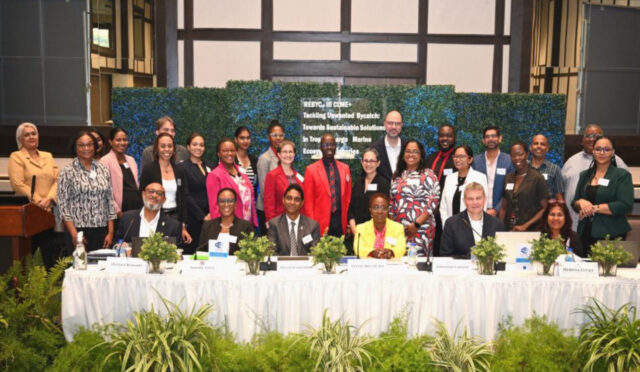
The University of the West Indies’ (UWI), Faculty of Food and Agriculture, in collaboration with the Food and Agriculture Organization of the United Nations (FAO), recently launched a multimillion-dollar project to tackle fisheries bycatch.
With a budget of US$5.3 million, funded by the Global Environment Facility (GEF) Trust Fund, the project titled “Strategies, technologies, and social solutions to manage bycatch in tropical Large Marine Ecosystem Fisheries (REBYC-III CLME+)” will be implemented in Barbados, Guyana, Suriname, and Trinidad and Tobago. It is expected to last for 48 months.
The UWI Faculty of Food and Agriculture will execute the project under FAO’s guidance. The primary goal of the REBYC-III CLME+ project is to effectively manage bycatch and minimize discards in the Caribbean and North Brazil Shelf Large Marine Ecosystems. This initiative aims to promote sustainable fishing practices that balance economic opportunities with the conservation of marine life, thereby aligning with the CLME+ Strategic Action Plan.
In his opening remarks at the Project Inception Workshop and the first meeting of the Project Steering Committee (PSC), Professor Indar Ramnarine, Deputy Principal of The UWI, St. Augustine Campus, highlighted the critical state of regional fish stocks and the high bycatch rates affecting endangered species. He emphasized the project’s role in ensuring the sustainability of regional fisheries.
Dr. Yvette Diei-Ouadi, Fishery and Aquaculture Officer at FAO, stressed the importance of effective fisheries management as a key component of FAO’s Blue Transformation Roadmap. She elaborated on how the roadmap aims to sustainably maximize the contributions of aquatic food systems to global food security and nutrition.
Dr. Simone Titus, Chief Technical Officer at the Ministry of Agriculture, Land and Fisheries of Trinidad and Tobago, reflected on the project’s alignment with the United Nations Sustainable Development Goals. She noted its innovative approach towards marine conservation and sustainable resource use, highlighting its focus on technology, governance, and behavioral change.
“The REBYC-III CLME+ project signifies a transformative approach to marine conservation and sustainable use. I am particularly encouraged by the project’s comprehensive approach.
“Tackling the barriers of limited technology, governance challenges, and the need for behavioural change is a testament to the holistic thinking that drives this project. It is this kind of innovation and foresight that will steer us towards a more sustainable and equitable use of our marine resources,” she added.
The workshop and meeting, conducted in a hybrid format at the Hilton Trinidad and Conference Centre, were attended by 28 in-person and 37 online participants. These included National Focal Points, heads of national fisheries administrations from participating countries, and various regional and international stakeholders. The PSC approved the project’s first-year work plan and budget of approximately US$1.59 million and established committees for technical, policy, and management oversight of the project.












